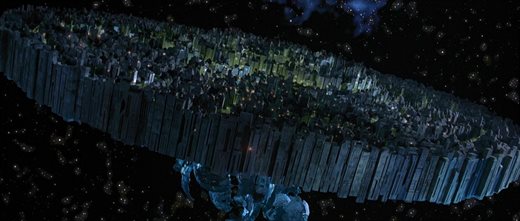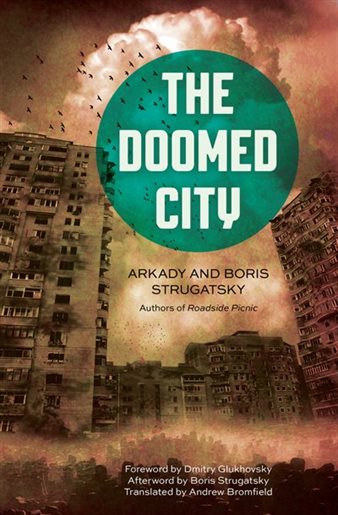If someone asked me what The Doomed City was about, I’d probably say it’s like a Soviet Dhalgren. It’s also like a Cold-War Russian Dark City, but since this novel obviously came first, I’m inclined to say that at least one of these properties ripped off The Doomed City to some extent.
(It’s Dark City.)
The actual plot of The Doomed City is rather loose — the story follows Andrei Voronin and a selection of other men through their lives in “The Experiment.”
The Experiment is nebulously described at a variety of junctions, but basically it comprises everything that the characters experience and interact with. They live in a city, but one with no defined location, climate or demographic. The inhabitants of the city come from a variety of nations and time periods, though all seem to represent, in one way or another, different political viewpoints that would have been of concern to a Russian citizen in the 1970s.
One might think of the Experiment as a massive fish tank, controlled by some unknown race of superintelligent aliens, in which humans take part in the building and daily function of a society, one that’s an odd amalgum of the societies from which they came.

The one key factor that seems consistent in The Experiment is that each subject begins his time on the lowest rung of the socioeconomic ladder and slowly rises through the ranks of society. When we first meet Andrei, he’s working as a garbage collector along with a ragtag group of friends. As the novel progresses, he becomes a detective, then a newspaper editor, then a city councillor. His close friends become policemen, reporters, and fellow councillors in turn, maintaining a similar, if progressively more powerful, group dynamic.
As numerous characters remark throughout the book, “The Experiment is The Experiment.” The apathetic claim becomes something of a mantra, a short, faithful prayer, a confirmation that they know nothing, that everything makes sense because it just does.
When baboons run rampant through the streets, when a seemingly sentient building devours citizens, when an expedition to the outer reaches of this uncharted “world” devolves into a madness of walking statues, temporal anomalies, and mysterious ruins, “The Experiment is The Experiment.”
For all this strangeness, The Doomed City never seems to veer into the same “supernatural” territory that fans of the Strugatsky’s best-known novel, Roadside Picnic, are probably familiar with. It’s a bit odd — The Doomed City might actually contain more of the observable supernatural, but that isn’t its focus.
Rather than painting a landscape, in The Doomed City the Sturgatsky brothers paint a dense party scene, an interpersonal drama with countless players major and minor, each with their own wants, aspirations, faults and failings. Certainly, many of these characters are political mascots, straw men built to represent political ideologies and time periods.
There’s a distinct lack of women in the novel. Those who do appear could be replaced with either men or blow-up dolls without affecting the plot in the slightest. The Doomed City is as much a product of its time as it is a comment on it. Does that make this particular flaw forgiveable? Maybe, at a stretch, although it does make it glaringly obvious that the Sturgatsky brothers are also the white men by and for whom history is interpreted — perhaps their coded opinion of events (for as much merit as it does have) should also be taken with a grain of salt.
There are a lot of grey areas here, and in the novel, and one thing that I can appreciate about it is that the authors do very little to try to adjust the contrast.
Is The Experiment the afterlife? Is it hell? A genuine scientific study by ultra-advanced aliens, or some kind of government conspiracy? By the end of the novel, you might have formed your own theories, which will either be shattered or supported by the novel’s deliberately ambiguous ending.
Read the book for its dense character studies and fascinatingly nihilistic social commentary — or put it down for its alienation of women and failure to build any real suspense.

One thought on “The Doomed City by Arkady and Boris Strugatsky”